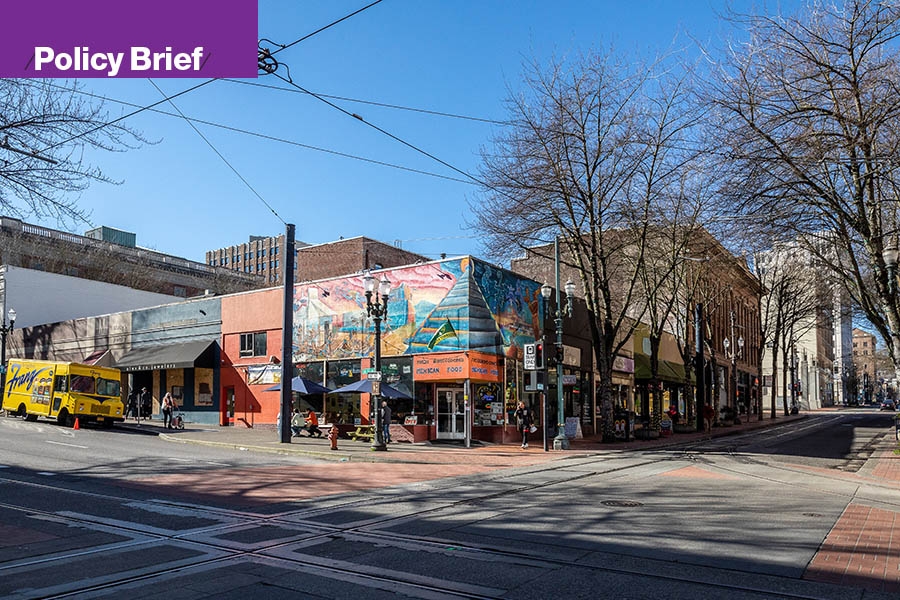Council must prioritize small business in the upcoming budget
The pandemic is an ongoing threat to the small businesses that make Portland the city we know and love. Many of our shops and independent restaurants may not survive a third year or yet another wave of the virus. As a civically minded small-business owner, I attend my share of meetings with local officials and other business and community leaders who are working on our city’s economic recovery efforts.
One discussion at the February meeting of Mayor Wheeler’s “Business Success & Job Creation Action Table” reveals how differently the pandemic has impacted different types of businesses. One participant shared how much they appreciate working from home, and that the pandemic otherwise had little impact on their day-to-day business.
I was struck by how starkly different one experience has been from mine as the co-owner of a retail shop. Those of us who own the iconic small shops that define Portland’s neighborhood business districts — one of the primary drivers of tourism before the pandemic — are now hanging on by a thread. City Council and all of our elected officials must do all they can to support the recovery of our region’s small businesses.
Our eclectic shops, restaurants and venues are what make our neighborhoods so vibrant. They’re the reason Portland stands out as such an appealing place to live and work. If Portland loses us, Portland loses this competitive advantage as well as thousands of jobs and community-centric businesses that go above and beyond to do right by their employees. Contrary to popular belief, we have not pivoted to online sales. A recent survey by Bricks Need Mortar indicates that 80% of retailers still conduct more than 70% of their business in the store.
In the next few months, City Council will make critical decisions about the City’s budget as well as the allocation of funds from the American Rescue Plan Act (ARPA). “Rescue” means urgency, and these desperately needed funds must be dispersed swiftly to those most greatly impacted by the pandemic. Here are some ways that City Council can show it truly understands and supports our small-business community:
n Create a flexible $15 million fund to provide commercial rent relief and eviction protection. Many of us owe tens of thousands of dollars in back rent from a time when we had zero or very limited sales. In general, our sales have not caught up to pre-pandemic levels, and yet landlords continue to charge pre-pandemic rents. In most cases, a commercial lease requires the tenant to pay all of the owner’s escalating expenses including property taxes, building management and repairs.
n Direct $5 million for grants to cover operational investments such as outdoor commerce, scheduling software, paid sick leave for employees infected by Covid, and spoiled-food inventory when restaurants are forced to abruptly close. Many small-business owners are risking their own credit to cover expenses with high interest and personal credit cards, and have little if any reserves to draw on in an emergency.
• Fund innovative programs to provide Portland Police with the resources they need to investigate property crimes. A recent survey of 113 retailers revealed that a whopping 63% of them had been vandalized or broken into in the last 18 months. While we fully support police-accountability efforts as well as those directed to criminal justice reform, there should not be a blanket license to burglarize our city’s shops. Based on our conversations with police officers, we no longer bother to file police reports, and we stopped calling 911 months ago. If the police are genuinely in need of additional capacity to investigate and prosecute these property crimes, City Council should make it so.
• Fully fund the citywide implementation of the Portland Street Response. Our storefronts are the frontlines of our city’s mental health and addiction crisis. We appreciate that this is a systemic issue that is generations in the making. Without immediate infusions of resources, we will continue to lose employees who no longer feel safe doing their jobs.
• Double down on the City’s 2021 ARPA investments to fuel local purchasing. In late 2021, Mayor Wheeler provided $30,000 worth of Kuto digital gift cards for PSU students that helped support local business. Even better, those purchases were made on a locally developed app that helps retailers avoid expensive credit card processing fees. Scaling this program citywide would be a shot in the arm for local retailers and restaurants, while encouraging Portlanders to shop local.
• Stop the bickering between the City, County and Metro, and implement the HereTogether measure now. Homelessness is a devastating humanitarian crisis as well as a threat to our small-business recovery. Meanwhile, politicians bicker endlessly during campaign season, and wealthy donors fund billboards about a bygone era. Those of us doing the work on the ground building our small businesses, employing thousands of Portlanders and creating vibrant, livable neighborhoods are a critical part of the solution.
Small independent businesses are the reason so many people fell in love with Portland in the first place. The city must step up to save our small businesses before it’s too late.
Bridgid Blackburn is the co-owner of Cargo, with locations in Portland and Astoria. She also serves on the Board of Directors for Business for a Better Portland, The Central Eastside Industrial Council and Venture Portland, and is an advisor to Bricks Need Mortar.




